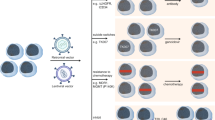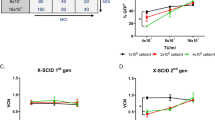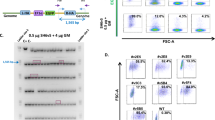Abstract
Retroviral transduction was used to introduce cDNAs encoding two mutants of human O6-alkylguanine-DNA alkyltransferase (hAT), one of which (hATPA) is 16 times more resistant to O6-benzylguanine (O6-beG), and the other (hATPA/GA) which is almost totally refractory to inactivation relative to the wild-type protein, into K562 human erythroleukaemic cells. A colony-forming assay was used to demonstrate significant protection (P < 0.001) against mitozolomide or temozolomide toxicity in k562 clones expressing either hat mutant, as determined from an in vitro assay of activity. however, protection against these agents was reduced in hatpa expressing cells in the presence of 1 μm o6-beG and was lost in the presence of 20 μM O6-beG while cells expressing hATPA/GA retained protection even in the presence of 20 μM O6-beG (P < 0.001). using primary human cord blood-derived cd34+ haemopoietic cells in which PCR analy-sis indicated that up to 70% of progenitors were trans- duced with retroviral constructs harbouring hATPA/GA, we observed significant protection of the granulocyte–macrophage colony-forming cells against mitozolomide (P < 0.05) and temozolomide (p < 0.001) induced toxicity in the presence of o6-beG. These findings indicate that retrovirus-mediated expression of hATPA/GA in primitive primary human haemopoietic cells is possible and does provide O6-beG-resistant protection for these cells. Using this strategy in patients may simultaneously permit attenuated myelosuppression and increased sensitivity of tumour cells to the effects of O6-alkylating agent chemotherapy. These data, taken together with the study reported by Chinnasamy et al in the accompanying article in this issue showing reduced toxicity and clastogenicity in murine haemopoietic progenitors, make a compelling case to test this strategy clinically.
This is a preview of subscription content, access via your institution
Access options
Subscribe to this journal
Receive 12 print issues and online access
$259.00 per year
only $21.58 per issue
Buy this article
- Purchase on Springer Link
- Instant access to full article PDF
Prices may be subject to local taxes which are calculated during checkout
Similar content being viewed by others
Author information
Authors and Affiliations
Rights and permissions
About this article
Cite this article
Hickson, I., Fairbairn, L., Chinnasamy, N. et al. Chemoprotective gene transfer I: transduction of human haemopoietic progenitors with O6-benzylguanine-resistant O6-alkylguanine-DNA alkyltransferase attenuates the toxic effects of O6-alkylating agents in vitro. Gene Ther 5, 835–841 (1998). https://doi.org/10.1038/sj.gt.3300698
Received:
Accepted:
Published:
Issue Date:
DOI: https://doi.org/10.1038/sj.gt.3300698
Keywords
This article is cited by
-
Retroviral transfer and expression of human MDR-1 in a murine haemopoietic stem cell line does not alter factor dependence, growth or differentiation characteristics
Leukemia (2002)
-
A novel dual function retrovirus expressing multidrug resistance 1 and O6-alkylguanine-DNA-alkyltransferase for engineering resistance of haemopoietic progenitor cells to multiple chemotherapeutic agents
Gene Therapy (1999)



